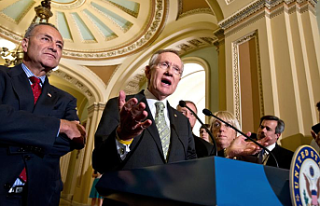Since then, Trump-aligned Republicans worked hard to make the way for the next time.
Republicans are gaining control of elections, a once-forgotten machine that was used in battleground states and elsewhere. Although the effort is imperfect and uneven, experts on democracy and Democrats warn that the United States is experiencing a slow-motion insurrection with better chances of success than Trump’s failed power grab last January.
They point out a growing list of evidence: Many candidates who deny Trump's loss have been running for office that could play a crucial role in the next president's election in 2024. The Republican Party in Michigan is stocking obscure members of local boards that could prevent an election from being approved. The GOP-controlled legislatures in Wisconsin and Pennsylvania are supporting open-ended "reviews," of 2020's election. This is based on an extremely flawed Arizona look-back. These efforts will fuel disinformation, anger and frustration about the 2020 results for many years.
This all happens as Trump's Republican Party aligns more with him. He has made denial of 2020 results a litmus-test for his support. Trump has supported primaries to purge lawmakers who have strayed from him and has even praised Jan. 6 rioters. Sixteen GOP governors signed laws that make it harder to vote. A poll by the Associated Press-NORC Center for Public Affairs Research found that two-thirds (63%) of Republicans don't believe Joe Biden was legitimately elected president.
Steven Levitsky, a Harvard political scientist who co-authored the book "How Democracies Dye", said that "it's not clear" that the Republican Party is ready to accept defeat. "The party has also become an anti-democratic force."
Republicans who raise alarms are not being heard by their party. Reps. Liz Cheney and Adam Kinzinger, both Republican from Wyoming, were members of a House panel investigating the Jan. 6, insurrection. They are often dismissed by their party as party apostates.
Local officials, who are the closest to the process' fragility and processes, are calling for change. Kathleen Bernier, a former election clerk and a GOP state senator, decried her party's attempts to take control of the elections process at a recent news conference.
Bernier stated, "These invented things people do to jazz-up the base is just despicable. I don't believe that any elected legislator should play that."
In Georgia, an election bill signed this year by the GOP governor gave the Republican-controlled General Assembly new powers over the state board of elections, which controls its local counterparts.
This law will be used to start a review of operations within the solidly-Democratic Fulton County. This county is home to most of Atlanta and could result in a state takeover. Additionally, the legislature passed legislation allowing local officials in six counties to remove Democrats from their election boards.
Pennsylvania's GOP-controlled legislature is reviewing the presidential election and subpoenaing voter data. Democrats claim this is an unprecedented invasion of voter privacy.
The GOP's focus in Michigan has been on the state's counties boards of canvassers. Trump called the two Republican members on the Wayne County board, which is home to Democratic-bastion Detroit to vote against certification in November 2020. This brought the little-known power of these committees briefly to the forefront.
Officials in Michigan say that if boards or canvassers fail to certify an election, they can be sued and forced to do so. However, this process could lead to chaos and serve as a rallying cry for election disputes.
Mark Brewer, an election lawyer who was also the former chair of Michigan Democratic Party, stated that "they're laying groundwork for slow-motion insurrection".
Georgia is where Trump is most visible. He is supporting U.S. Rep. Jody Haice, who voted against Biden’s Electoral College win on Jan. 6 in a primary against Brad Raffensperger, the Republican secretary-of-state. Trump's appeals to him to "find enough votes" to declare him the winner were rejected by Hice.
Trump encouraged David Perdue, a former U.S. senator to run for governor. Brian Kemp was the Republican primary winner. Trump tried to get Kemp to declare him victorious in 2020, but Kemp refused.
Multiple lawsuits filed in Nevada to reverse Biden's victory were dismissed by Nevada judges. Jim Marchant, an ex-GOP state legislator, filed a suit to overturn his congressional loss. It was also dismissed. Barbara Cegavske (current Republican secretary of State), who is term-limited, concluded that there was no evidence of fraud in the contests.
Democratic governors in Wisconsin, Pennsylvania, and Michigan have been a significant obstacle to the GOP's efforts to reform elections. They have also vetoed new rules, which Democrats claim are designed to make it more difficult for people of color vote.
The U.S. governors play a crucial role in elections. They certify winners in their states and allow for the appointment of Electoral College Members. This raises concerns that Trump-friendly governors might try to certify him as the winner of their states' electoral votes, regardless of how many votes he received.
Some Republicans also argue that state legislatures have the right to name their electors regardless of what the vote count says.
However, Democrats have not been able to clearly define the stakes in these elections. According to Daniel Squadron, of The States Project, a Democratic group trying to win state legislatures, it is difficult for voters believe that the system might be vulnerable.
He stated that the most motivated Americans today are those who believe the 2020 election was stolen. "Acknowledging that this is happening requires such a leap in any core American value system that anyone of us has ever lived through."












